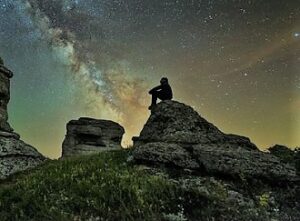
Nature, man and the divine
It is the development of human culture that can develop these potentialities, as Morin says: “It is certainly culture that allows the development of the potentials of the human spirit” (Morin, 1977, p. 110), it depends, therefore, on the development of a culture of peace, solidarity and of preserving life within the human spirit.
these potentialities, as Morin says: “It is certainly culture that allows the development of the potentials of the human spirit” (Morin, 1977, p. 110), it depends, therefore, on the development of a culture of peace, solidarity and of preserving life within the human spirit.
We are part of nature and the anthropocentric concept needs to be modified, but it is “only at the level of individuals who have possibilities of choice, decision and complex development that impositions can be destructive of freedom, that is, become oppressive” (ibid.), but this depends on the development of culture, or on the sphere of thought (Teilhard Chardin’s Noosphere) Morin will say: “It is certainly culture that allows the development of the potential of the human spirit” (idem ), depends, therefore, on the development of a culture of peace, solidarity and preservation of life that cannot exclude Nature.
Morin will say in the chapter of his conclusion about the “complexity of Nature”, that in the so-called “animistic” universe, or mythological in the case of the Greeks, “human beings were conceived in a cosmomorphic way, that is, made of the same fabric as the universe” (Morin 1977, p. 333), and at this point Teilhard Chardin develops the concept of a deified universe, or said within Christian cosmology: “Christocentric”, which is why he was for some time accused of pantheism (many gods).
Science penetrates more and more into a universe full of surprises, from the Higgs boson to the Hubble constant that establishes both the size and the age of the universe, but is this the consolidation of the unity of physics, called today as standard Theory of Physics , but this constant has already been modified.
In astronomical terms there is the measure megaparsec, which is equivalent to 3.26 million light years away, Hubble first time measured 500 km per second per megaparsec (km/s/Mpc) earth´s diameter, but this measurement now varies between 67 and 74 km /s/Mpc.
The nature of the interior of the planet also varies and there are many uncertainties, due to the exposure of the Cumbre Vieja volcano in the Canary Islands, many serious scientists and researchers, there are many fake News on the subject, it is clear that there are still no clear theories about nature of these planetary organisms, always present in the stories.
The dialogue between different worldviews, far from simplifying or reducing the thinking of their culture, broadens and helps to develop the others, but it is necessary to be clear that each one has a contribution to make, and each one can remain in their cultural identities, for the most part of them there is always a precedence of the divine over human love.
For many worldviews the divine means to be able to dialogue with the human penetrates the mysteries of the universe and thought (the noosphere), in the Christian worldview this is explained in two steps: Love God and love your neighbor, so says the biblical passage (Mc 12, 29-31) on Pharisaism’s questioning of Jesus about what the commandments were: “Jesus replied: “The first is this: Hear, O Israel! The Lord our God is the only Lord. You shall love the Lord your God with all your heart, with all your soul, with all your mind, and with all your strength! The second commandment is: You shall love your neighbor as yourself! There is no commandment greater than these”.
Thus, Pharisaism will relativize the first “commandment” to prioritize the second, only love of neighbor matters and defines the Christian, in general they reduce to their group and do not dialogue with other cultures, the second (love God above all things) , denies the inclusion of the second commandment and moves towards fundamentalism and the denial of science as a culture, in addition to also denying other non-Christian worldviews.
The dialogue between different worldviews, far from simplifying or reducing the thinking of their culture, broadens and helps us to develop the others, but it is necessary to be clear that each one has a contribution to make, and each one can remain in their cultural identities.
CHARDIN, T. (1997) Man’s place in nature, trans. Armando Pereira da Silva, Ed. Instituto Piaget, Lisbon.
MORIN, E. (1977) The nature of NATURE. Lisbon PUBLICATIONS EUROPA-AMERICA, LDA., 1977.









